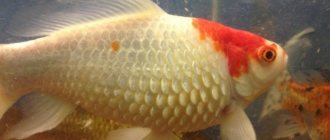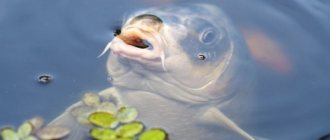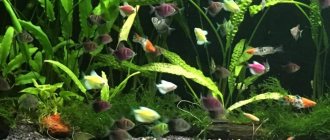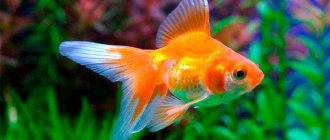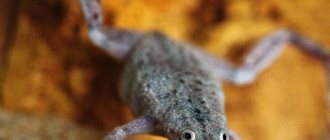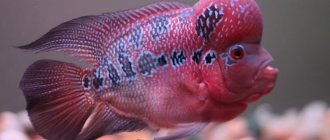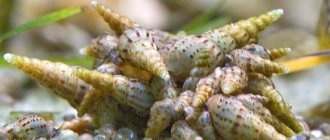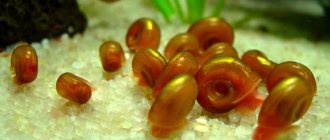For most families, keeping a home aquarium is an opportunity to calm down, relax, gain relaxation and psychological comfort. Designers often add an aquarium to the interior to create a unique design, and psychologists recommend having waterfowl pets to achieve psychological balance. However, no one thinks that fish can also be distinguished by intelligence. During experiments, scientists divided them into 2 categories: smart (cichlids, elephant fish, gnatonemus) and stupid (gupeshki).
Cichlids are the smartest fish
Cichlids are tropical predatory fish that often delight the eye of aquarists.
These aquatic pets cannot be placed in public aquariums because... they are aggressive towards their cohabitants, who can later be eaten, beaten or beaten by cichlids. To introduce such fish into a pond, you need to plant only hard-leaved plants with a strong root system, because others may be torn out. And if the aquarist keeps fish of the cichlid subspecies, then they do not need vegetation at all. Cichlids are intelligent fish. Their behavior is characterized by bright individual traits, including recognition of the owner.
Origin of cichlids
For the first time, cichlids were discovered in the waters of Africa, South America, and Asia and they were classified as perciform fish. To distinguish them, pay attention to the nasal cavity, it has a couple of holes.
There are also Western and East African perciformes native to Lake Malawi. They have an unusual color, so they are widely in demand among aquarists, but this is not the only thing that attracts them. First of all, people buy such fish because of their behavioral and intellectual characteristics:
- Individual behavioral traits.
- The ability to recognize the area, feeding place, owner.
- During the mating season, fish are able to change color. The right to choose a partner remains with the female, but for this they must be kept together from an early age.
- Before throwing eggs, the male himself prepares a place for spawning.
- Protection of fry. Initially, the female contains eggs in her mouth. When the fry hatch, the fish continues to look after its offspring and occasionally releases them for feeding periods. However, if the female suspects danger, she collects the offspring back into the oral cavity and hides in a secluded place: a grotto or cave.
In order for an intelligent fish to feel good in a home aquarium or pond, you should create comfortable conditions for it. To do this, you need to make a large expanse of water and provide many shelters.
Problem solving
In humans and animals, finding solutions to problems requires fairly high cognitive abilities. Animals must remember the objects around them and understand how they can be used for their own purposes. They must be able to establish a logical connection between the tool and its application.
Pisces are amazingly smart, and are able to solve problems they face using tools, memory, and skills. For example, Dr. Pasko from Wroclaw observed a fish that used sharp stones as an anvil to break the oversized pellets it was fed so that it could swallow them.
Another example of fish using skills to solve problems comes from an experiment conducted by scientists at the University of Cambridge. Two fish were trained to leave their hiding place, located in the middle of the tank, to swim for food, which was placed to the right and left of it. As soon as the fish realized this, they split up: one collected food from the right side of the tank, and the other from the left.
Both individuals clearly wanted to swim in the opposite direction to take food from their neighbor, but they wisely decided to leave each other alone, since otherwise they would have been more vulnerable. Even if there was no food, everyone followed their usual direction from the tank and looked for food. Not finding food, they swam to the opposite side, to the neighbor’s bins and looked for what they could profit from on his territory. This is quite an advanced behavior that you wouldn't expect from an animal with a three-second memory!
We also recommend reading:
The largest dog breeds What is domestication in animal husbandry Why you should get a cat: reasons voiced by scientists Euthanasia of animals
Elephant fish: second place
Elephant fish amazed scientists at the University of Bonn. It turns out that it has low-power electric fields, with the help of which it:
- distinguishes between dead and living aquatic individuals;
- differentiates objects of material origin;
- moves in completely dark areas thanks to its proboscis.
The elephant fish spends most of its time practically on the surface of the water, sticking its special proboscis out. His actions resemble the work of a metal detector because... she moves her trunk left and right. This procedure allows the aquatic inhabitant to catch insect larvae.
This proboscis also replaces the eyes of the elephant fish. Thanks to him, she sees material objects, estimates the distance between them, concretizes their outlines, etc.
Features of the elephant fish
- The presence of a so-called flashlight: it is located on the tail of the fish and consists of cells that produce electrical charges. The pet is capable of creating electrical impulses up to 80 times per second.
- The presence of electrosensitive cameras: they are capable of detecting flashlight discharges. Thanks to these functions, the elephant fish clearly sees the images around it.
- Distinguishes between living and non-living beings: this happens due to the receipt of electrical radiation of different strengths from them, which have different effects on the biofield of the elephant fish.
- Distinguishes the origin of metallic and non-metallic objects.
- Measures the distance to an approaching object.
Scientists have confirmed that the elephant fish has considerable intellectual potential, due to the ratio of brain mass and body weight, compared with the same data in humans.
Genetics
As mentioned earlier, there is a big difference between types of fish. Most anglers know that some fish are harder to catch than others. For example, trout have good eyesight, which helps it detect and identify the insects it preys on. This is why anglers go to such great lengths to make realistic flies that look almost natural. However, there are differences in intelligence and behavior between species. Just like people, some individual fish are simply smarter than others.
It has been proven that in certain species of fish, intelligence and the ability to be caught are associated with the transmission of genetic characteristics to their offspring. This is important for any angler to know. Although it has not been fully proven, it is believed that since less cunning fish are more often caught on the hook, then smart fish have a greater opportunity to reproduce offspring and pass on their genes to them.
If it is possible that intelligent fish can be bred, then it stands to reason that less intelligent fish can also be bred. Dr. Gary Garrett tested this theory at the Hills Research Station in Texas. He began breeding largemouth bass (Micropterus salmoides), which were quite aggressive and easy to catch. It turned out that she gives birth to offspring that are also aggressive and easy to catch. This concept was brought to the American Sportfishing Association in Montgomery, Alabama by Don Keller and Barry Smith. They selectively bred aggressive Largemouth Bass for fifteen years and named this new hyper-aggressive breed "Gorilla Bass."
Progress of the experiment
The essence of the experiment: fish of the cichlid subspecies were introduced into new aquariums and fed in one place.
After 3 days, they were moved to another aquarium and allowed to rest for 12-14 days. After this, the cichlids were returned to their familiar aquarium, and their movements were monitored with a special program. Research has shown that once in their familiar territory, the fish quickly found their bearings and swam to the place where they had previously found food. At this stage of research, professors from the Society for Experimental Biology are studying: can fish memory depend on the environment?
Physiological features of the fish brain. Conclusion of the experiment
Previously, it was believed that the human brain is the most active and largest, but compared to body weight, it is only 2 - 2.5%. Therefore, mice, birds or monkeys surpass humans in this data, having a brain weight of up to 6.6%, and are the record holders in the animal kingdom.
Professors from Sweden conducted research on the African fish Gnatonemus and found that, relative to its body length of 25 centimeters, it has a brain weight of 3.1%. It turns out that this is a lot for their weight category and the brain lobe accounts for less than 1% of the total body weight.
Also, the professors compared the indicators of animals, humans and gnatonemus fish regarding the energy consumed by the body, in comparison with the size of the brain:
- animals – up to 8%;
- people – more than 20%;
- Gnatonemus fish – 60%.
Memory
Memory is a key component of intelligence. It allows you to process information and learn. Without it, animals cannot learn much beyond their basic instincts. Many studies have been conducted to test the memory capabilities of fish. As expected, their memory varies by species. Studies conducted in mazes show that fish have spatial memory, and due to this they move along a memorized route. And a study of catfish found that they can remember a human voice announcing the start of a meal for as long as 5 years.
Fish memory is of great importance to fishermen. Studies of carp have shown that if you catch this fish at least once and release it, then the next capture of a particular individual will be much more difficult. The fish remembers that it was caught, and it can already associate various situations with stressful events. These events can be a bait on a hook, the sound of a motor, an echo sounder, or the noise of an angler moving in a boat. They may even avoid specific areas where they were caught to avoid a repeat of the situation in the future.
Most anglers know that trained fish can avoid different types and colors of bait. This is why there are so many baits out there and new and unique ones are constantly being introduced. All this helps the fishing products industry stay afloat, because fishermen are constantly demanding something new.
5.Cats
Cats are on the same list as the smartest animals in the world. In their intelligence and skills, they are comparable to dogs and are in no way inferior to them. They can understand human speech, perform certain tasks intuitively, and are also extremely cautious. They can win without any problems in an unequal battle with a strong opponent.
Cats in extreme situations can show ingenuity and also carry out certain human commands. We are well trained; you only need to take a few lessons to consolidate the acquired skills and abilities.
6.Rats
In this rating, rats occupy sixth position. Their main feature is the ability to bypass the mousetrap, take the prey and at the same time stay alive. According to scientists, rats have a collective mind, which will allow animals to survive even in extreme conditions. When hunting in packs, there is always a leader with scouts, whose goal is to taste the food for poison or poison. If the rats died, then other members of the pack will ignore food offered in the future.
7.Crows
The crow is the smartest bird in the world. They are distinguished by excellent intelligence. Thieves, even if given the right opportunity, can steal various things from a person. If a crow chick communicates with a person, it becomes tame and at the same time its level of intelligence increases. When hunting, crows fly into flocks to gain an advantage over the enemy. These characteristics of birds allowed them to be included in the ranking of animals with great mental abilities.
When stealing other people's eggs, several individuals act simultaneously. During this raid, one of the birds distracts the enemy, while the second one steals the egg. When the bird manages to find a nut, it understands the need to crack it. To do this, the crow rises to a height and carefully drops the nut onto a hard surface. In any case, when obtaining food, each crow will show ingenuity.
10.Pigeons
Pigeons are placed in the top tenth position. The natural mind of these birds is developed in such a way that they are able to recognize a mirror image, as well as store a lot of information in memory, which they somehow reproduce in the future. For many years, pigeons have been used to convey postal messages. Based on this fact, we can talk about the unique mental abilities of pigeons.
8.Squirrels
In the ranking of the smartest animals on the planet, squirrels are in eighth place. Their main feature is that they are almost not afraid of people. This fact is evidenced by the fact that squirrels prefer to settle near people's houses. When a person starts feeding a squirrel, it gets used to it and will keep coming back in the future. This speaks of her intelligence and intelligence.
If the squirrels cannot eat everything at once, they will hide the food until better times. Before the winter period, they create several dozen different caches of food. Throughout the winter, they remember each of them, which also shows their intelligence and survival skills.
9.Pigs
Among all animals, pigs were placed in ninth place. In some ways, pigs are far superior in intelligence to dogs and cats. They can be trained without any problems and can also perform a large number of simple tricks and exercises. The biological clock in pigs is perfectly developed. For all these advantages, pigs are ranked ninth in the ranking of the smartest animals in the world.
By constantly caring for pigs, they will know exactly what time to feed. If there is a delay, then the animals begin to grunt and show their displeasure. Previously, many scientists have proven that in addition to their intelligence, pigs are distinguished by strong nervousness. With a small hand clap, the entire flock of pigs freezes and waits for something.

